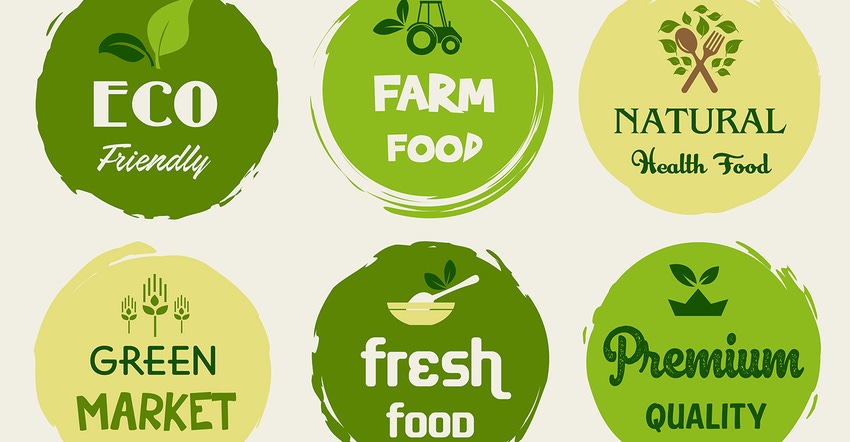Sustainability, certifications and claims: What resonates with consumers?
Americans are widely aware of—and making purchasing decisions—based on food certifications such as organic and non-GMO.

You’ve heard the saying, “You are what you eat.” Now we have certifiable proof.
A new decade is underway, and consumers have never been more vigilant about understanding what’s in their food, and the impact of food production on the environment, animals and people. As a result, third-party certifications surrounding food production and sourcing are growing and changing the game. Certifications can be a valuable tool to provide increased transparency to business practices and standards, but they come with an investment of time and resources, leading to the question: Do certifications resonate with consumers and at what capacity?
Americans are widely aware of food certifications and are increasingly making purchasing decisions based on those certifications. According to proprietary gathered in November 2019 from Linkage Research's Free From Forum Market Monitor—a tracking study of key natural, free-from, and better-for-you attributes—a whopping 95% of Americans reported they are aware of one or more food certifications, and 59% reported they purchase one or more foods with certifications. Data indicate consumers aren’t just picking up these certifications because they are on the package already. Three-fourths of consumers noted that one or more food certifications are important when it comes to choosing which products to buy, and 78% of consumers said they are willing to pay a premium for a product with a certification. To better understand which certifications resonate most with consumers, it helps to examine the macro factors driving consumers to re-evaluate food.
The first and arguably most important factor changing consumer eating habits is their desire for wellness. Seventy percent of Americans reported they are proactively trying to support their health through exercise and diet. And this focus on their own wellness has fueled changes in how they think about food. Today’s consumer wants food that is naturally sourced and produced, not fueled by artificial or man-made ingredients and chemicals that they have deemed unhealthy. In their quest to find natural food to support their wellness, consumers want transparency about how their food has been grown, sourced and produced.
This consumer desire for transparency and distrust in “big food" (the name given by the media to an industry in which a few huge companies dominate food production) has fueled the demand for certifying bodies to assure consumers that their food is natural, clean and good for them. Because of this prominent focus on wellness, the certifications most in demand among Americans are those related to natural farming and sourcing of ingredients, including USDA Organic, Non-GMO Project Verified and Certified Naturally Grown. Of U.S. households, 63% reported these certifications are important when choosing which food products to purchase, and they seek out these certifications because of the third-party reassurance that the products are natural. Americans are also voting with their wallets for products that contain these certifications—of those familiar with the certifications, 54% reported buying products with the USDA Organic certification, 50% with the Non-GMO Project Verification and 46% with the Certified Naturally Grown designation. When these certifications come with a premium price, 6 in 10 consumers who are aware of these certifications are willing to pay more for them.
A certification creating recent buzz around food safety and health is the Glyphosate Residue Free Certification from the Detox Project. This certification verifies that products do not contain the world’s most used herbicide—glyphosate—which has recently been connected to health concerns like cancer (Carcinogenesis. 2018 Oct 8;39(10):1207-1215). Consumer awareness of this certification is still relatively low (32%), but those familiar with the certification are willing to pay a premium to ensure their food is free from the chemical.
The second factor influencing how consumers shop for food is a desire to support companies focused on “doing good,” as demonstrated by making ethical choices and using profits to do what’s right for people, animals and the ecosystem. According to the 2018 Edelman Earned Brand study, 57% of Americans agree it is easier to get brands to address social problems than the government, and 64% of consumers reported they choose, switch or avoid brands based on where they stand on societal issues.
This desire to back brands that are doing good has driven a second group of food certifications that center around the ethical treatment of humans and animals, including Fair Trade Certified, Certified Humane Raised and Handled, Certified Sustainable Seafood and Rainforest Alliance Certified. Nearly 40% of U.S. households familiar with these certifications reported one or more are important when choosing which food products to purchase.
Among these ethically oriented certifications, the ones with the most awareness are those related to the treatment and living conditions of animals and the humans involved in the food production, including Fair Trade Certified (59%), and Certified Humane Raised and Handled (52%).
Consumers want to know that the dollars they are spending on products are going toward good deeds, and as one consumer shared in our research, “I like to know that the product I am buying is not being made by poorly treating humans.” Products with the Fair Trade Certified and Certified Humane Raised and Handled certifications aren’t yet as widely purchased as ones like USDA Organic, but they are making their way into more than one-third of consumers’ baskets today.
Another certification growing in popularity is the Certified B Corp., which is a movement started in 2006 to ensure that certified companies are using their business and profits as a force for good, including the impact on workers, customers, community and environment. This certification is less familiar to consumers, perhaps because of its broad scope, but company adoption of this certification is growing. Ben & Jerry’s, Patagonia and Allbirds are a few of the companies carrying it. These companies all have a mission to do better and align profit with purpose, and their investment in the B Corp. certification backs this commitment.
The idea of “responsible consumerism” is growing as Americans are turning their dollars toward companies and brands that are backed by a commitment to bettering the planet for generations to come. As the debate over the welfare of the planet—specifically climate change—goes on, Americans are broadly concerned about the impact of their habits on the future. Nearly 60% of Americans agreed that farming and food production practices impact climate change, and this is even higher among younger generations, at 63%. And Americans’ ecological concerns are not all related to climate change, as another 62% of Americans agreed if food production methods don’t change, it will be impossible to produce enough food for everyone on earth in the future.
With these growing concerns about the impact of consumerism on the planet, a number of certifications have been in the spotlight over the past few years that support farming principles and practices that go beyond organic to benefit the environment even more. The Regenerative Organic Certification was launched by the Rodale Institute in 2018 and supports farmers who use growing and grazing practices that regenerate topsoil, improve water retention and help to sequester carbon in the soil. The Demeter Certified Biodynamic seal is another model that supports farming practices that ensure self-sustainability of the soil, integrating plants and animals, and encouraging biodiversity. Although this certification program was established in the 1920s, it is now gaining traction due to growing ecological concerns.
Consumer awareness of these certifications is still relatively low among the general public; however, major companies such as Danone and General Mills have invested in farms that practice farming methods including regeneration and are promoting this certification on their food packaging. Large, well-known brands like these have a major impact on food sourcing and production; plus, their commitment to these certifications and practices delivers a strong message about their commitment to improving the future of food production and its impact on the planet. As more companies adopt these practices, these certifications are primed to grow in both awareness and purchase.
Looking to the future, consumers familiar with factors like organic, sustainable and cruelty-free reported they believe these qualities will grow in importance, which is a good indication that the certifications associated with these attributes will gain traction. But not all companies can or should invest in certifications. Choosing which of these certifications, if any, is right for one’s brand can be done through an understanding of the brand’s positioning—what the company stands for and the intended consumer target. When considering these factors, it should become clear where a certification can deliver a powerful reason-to-believe in a company’s brand or product promise.
Carrie Schaefer is the vice president of strategy and marketing at Linkage Research & Consulting. The firm provides brands with the latest understanding of the better-for-you marketplace, trends and consumer needs via access to a robust data monitor, syndicated reports and custom research.
About the Author(s)
You May Also Like






